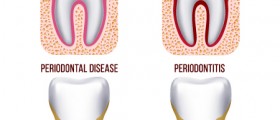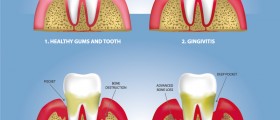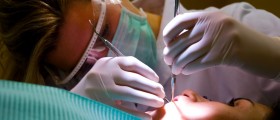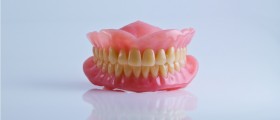
Introduction
In milder cases the symptoms may not even occur and the person does not even know they have gum disease. This condition can have serious consequences for the overall health so it is important to have regular check-ups at the dentist’s and prevent possible problems.
Gum disease, which can cause significant problems, can easily be prevented with frequent and proper oral hygiene and care. Every person should make it part of their daily routine to brush at least two times a day and to floss every day.
What is gum disease
Mild gum disease is called gingivitis, while the more severe form is called periodontitis.
Every person has bacteria in their mouth. Most of them are “good” bacteria which live there without causing problems. Bacteria form plaque, a soft white substance on the surface of the teeth, and they live underneath it. This substance needs to be removed properly and frequently, by brushing and flossing, otherwise it may harden and calcify and form tartar, which cannot be removed by brushing and requires a treatment by a dental hygienist.
Bacteria that live beneath tartar can spread, invade the gum tissue and cause inflammation to the gums. The first stage of the inflammation is gingivitis.
If the bacteria spread further, they affect the root of a tooth and this is called periodontitis. The gums pull away from the tooth and leave a pocket. If the disease progresses even further, it affects the law bone which weakens and causes teeth to fall off.
Consequences of gum disease
Bad breath or halitosis is often associated with gum disease. It can be eliminated with frequent brushing, flossing, cleaning the surface of the tongue, inner cheeks, and roof of the mouth.
If halitosis happens due to bacteria infestation in the pockets caused by gum disease, its elimination requires treatment by a dentist or oral hygienist.
Bacterial infection due to gum disease may spread to the jaw and cause some of the teeth to loosen and fall off.
Pregnant women should take special care of their teeth and gums, because gum disease, especially in severe stages, may lead to premature birth or even miscarriage.
Recent studies have shown that bacteria from the pockets can easily enter the bloodstream and cause hardening of the blood vessels, or atherosclerosis. This is one of the major risk factors for stroke and cardiac arrest. Gum disease also contributes to osteoporosis or bone loss.












,-Don't-Ignore-Receding-Gums_f_280x120.jpg)




Your thoughts on this
Loading...